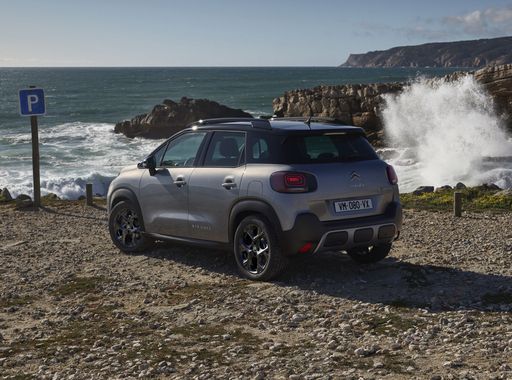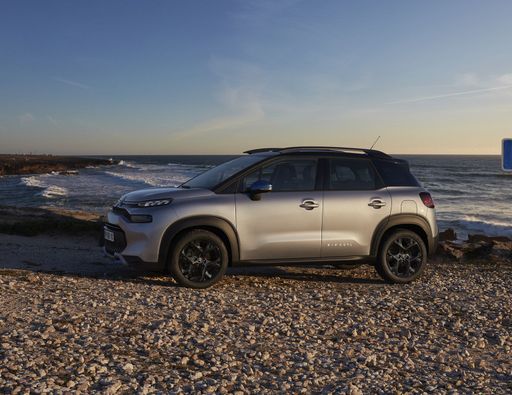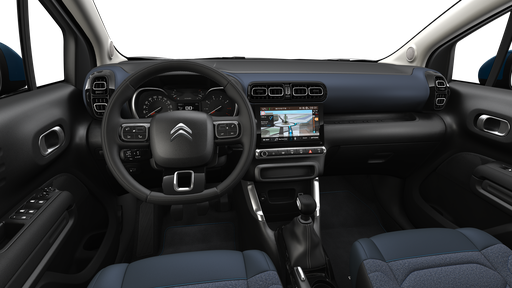Citroen C3 Aircross vs Toyota Yaris Cross - Differences and prices compared
Compare performance (145 HP vs 130 HP), boot space and price (16200 £ vs 23700 £ ) at a glance. Find out which car is the better choice for you – Citroen C3 Aircross or Toyota Yaris Cross?
Costs and Efficiency:
Looking at overall running costs, both models reveal some interesting differences in everyday economy.
Citroen C3 Aircross has a convincingly advantage in terms of price – it starts at 16200 £ , while the Toyota Yaris Cross costs 23700 £ . That’s a price difference of around 7500 £.
Fuel consumption also shows a difference: Toyota Yaris Cross manages with 4.50 L and is therefore a bit more efficient than the Citroen C3 Aircross with 5.30 L. The difference is about 0.80 L per 100 km.
Engine and Performance:
Power, torque and acceleration say a lot about how a car feels on the road. This is where you see which model delivers more driving dynamics.
When it comes to engine power, the Citroen C3 Aircross has a somewhat edge – offering 145 HP compared to 130 HP. That’s roughly 15 HP more horsepower.
In acceleration from 0 to 100 km/h, the Toyota Yaris Cross is a bit quicker – completing the sprint in 10.70 s, while the Citroen C3 Aircross takes 12.30 s. That’s about 1.60 s faster.
In terms of top speed, the Toyota Yaris Cross performs slightly better – reaching 170 km/h, while the Citroen C3 Aircross tops out at 143 km/h. The difference is around 27 km/h.
Space and Everyday Use:
Whether family car or daily driver – which one offers more room, flexibility and comfort?
Both vehicles offer seating for 5 people.
In curb weight, Toyota Yaris Cross is a bit lighter – 1180 kg compared to 1312 kg. The difference is around 132 kg.
In terms of boot space, the Citroen C3 Aircross offers a bit more room – 460 L compared to 397 L. That’s a difference of about 63 L.
In maximum load capacity, the Citroen C3 Aircross performs noticeable better – up to 1600 L, which is about 503 L more than the Toyota Yaris Cross.
When it comes to payload, Toyota Yaris Cross slight takes the win – 510 kg compared to 462 kg. That’s a difference of about 48 kg.
Who wins the race?
The Citroen C3 Aircross proves to be leaves the rival little chance and therefore becomes our DriveDuel Champion!
Citroen C3 Aircross is the better all-rounder in this comparison.

Citroen C3 Aircross
Costs and Consumption
View detailed analysis
Engine and Performance
View detailed analysis
Dimensions and Body
View detailed analysis
Citroen C3 Aircross
The Citroën C3 Aircross is a cheeky compact SUV that trades bland conformity for playful French character and clever practicality, ideal if you want a car with personality. It soaks up city life with a comfortable ride, inventive cabin tricks and a look that turns heads without asking for attention.
details



Toyota Yaris Cross
The Toyota Yaris Cross takes the jaunty personality of the Yaris and gives it a taller stance and a bit more practicality, so you get city-friendly agility with added SUV presence. It’s easy to live with, economical on the daily grind, and smartly packaged — a sensible pick for buyers who want fuss-free transport with a touch of character.
details






Costs and Consumption |
|
|---|---|
|
Price
16200 - 28200 £
|
Price
23700 - 34300 £
|
|
Consumption L/100km
5.3 - 5.9 L
|
Consumption L/100km
4.5 - 4.8 L
|
|
Consumption kWh/100km
16.3 - 18.3 kWh
|
Consumption kWh/100km
-
|
|
Electric Range
303 - 400 km
|
Electric Range
-
|
|
Battery Capacity
-
|
Battery Capacity
-
|
|
co2
0 - 134 g/km
|
co2
101 - 108 g/km
|
|
Fuel tank capacity
-
|
Fuel tank capacity
36 L
|
Dimensions and Body |
|
|---|---|
|
Body Type
SUV
|
Body Type
SUV
|
|
Seats
5
|
Seats
5
|
|
Doors
5
|
Doors
5
|
|
Curb weight
1312 - 1608 kg
|
Curb weight
1180 - 1290 kg
|
|
Trunk capacity
460 L
|
Trunk capacity
320 - 397 L
|
|
Length
4395 mm
|
Length
4180 mm
|
|
Width
1795 mm
|
Width
1765 mm
|
|
Height
1640 mm
|
Height
1595 mm
|
|
Max trunk capacity
1600 L
|
Max trunk capacity
1097 L
|
|
Payload
407 - 462 kg
|
Payload
485 - 510 kg
|
Engine and Performance |
|
|---|---|
|
Engine Type
Electric, Petrol, Petrol MHEV
|
Engine Type
Full Hybrid
|
|
Transmission
Automatic, Manuel
|
Transmission
Automatic
|
|
Transmission Detail
Reduction Gearbox, Manual Gearbox, Dual-Clutch Automatic
|
Transmission Detail
CVT
|
|
Drive Type
Front-Wheel Drive
|
Drive Type
Front-Wheel Drive, All-Wheel Drive
|
|
Power HP
101 - 145 HP
|
Power HP
116 - 130 HP
|
|
Acceleration 0-100km/h
12.3 - 13 s
|
Acceleration 0-100km/h
10.7 - 11.3 s
|
|
Max Speed
143 km/h
|
Max Speed
170 km/h
|
|
Torque
125 - 230 Nm
|
Torque
-
|
|
Number of Cylinders
3
|
Number of Cylinders
3
|
|
Power kW
74 - 107 kW
|
Power kW
85 - 96 kW
|
|
Engine capacity
1199 cm3
|
Engine capacity
1490 cm3
|
General |
|
|---|---|
|
Model Year
2024 - 2025
|
Model Year
2024 - 2025
|
|
CO2 Efficiency Class
A, D
|
CO2 Efficiency Class
C
|
|
Brand
Citroen
|
Brand
Toyota
|
What drivetrain options does the Citroen C3 Aircross have?
The Citroen C3 Aircross is offered with Front-Wheel Drive.




